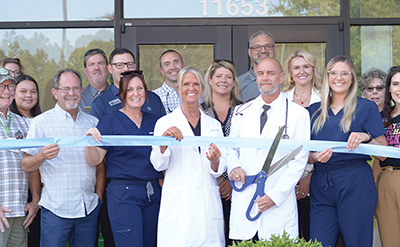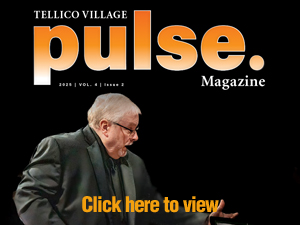QC Kinetix opens in TCreek

Dr. Douglas Campbell, QC Kinetix medical director, said regenerative medicine treatments can help give people back their freedom to do things they want to do and get relief from pain.
The clinic, located at 11653 Parkside Drive, celebrated its opening with a Farragut West Knox Chamber of Commerce-sponsored ribbon cutting Wednesday, Aug. 28.
“We have a location in Powell that has been quite successful,” Campbell said “And, Farragut’s kind of a natural fit for our patient population.”
“Medicine and treatments have evolved and changed so much over decades,” FWKCC president/CEO Julie Blaylock said. “I remember my grandmother, who was 90, was a hard worker and came from good European stock and worked a farm her whole life and loved hard work.
“I remember one of the last things she said to me was ‘I would give anything for any kind of hard work if I had the body to do it,’” Blaylock related. “That made me value work ethic, but having the body to do things you want to do.”
Campbell explained QC Kinetix is a field of regenerative medicine, using orthobiologics, “which are products derived from your own body’s tissues.
“Basically, we draw different elements out of blood or bone marrow, concentrate them and then put them back into the patient’s own body,” he added. “Your body is kind of Route 40 — It’s in a constant state of breaking down and being repaired.”
Simply put, “That’s just the natural order of the human body. Your body has signaling pathways and mechanisms to affect those repairs and also break itself down,” Campbell said. “It has a demolition crew and a construction crew; and when those crews get out of whack, then you end up with problems like arthritis and inflammation.
“So, if you can get the right members of those crews out of the blood and put them into the joint, then you can redirect that healing,”he added.
The office is open from 7 a.m. to 7 p.m., Wednesdays but patients/potential patients can call 865-238-4799 24 hours a day to book an appointment.
“It’s a fascinating field,” Campbell said. “I first became interested in it about 15, 16 years ago when my right hip went bad — Basically, I had a stroke in my hip.
“I was looking at a total hip replacement,” he added.
At that time, the alternative to surgery was stem cells, but “it wasn’t ready for prime time … but I’ve been following the field ever since,” Campbell said.


